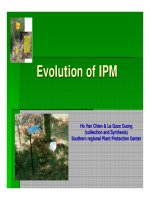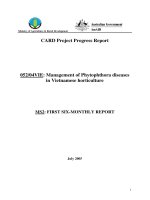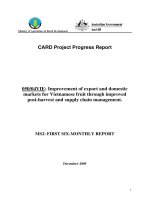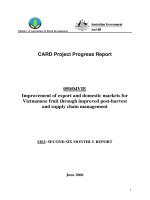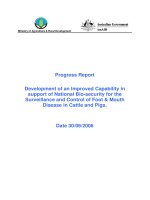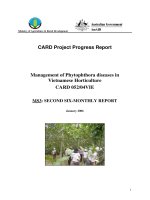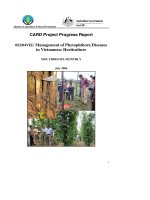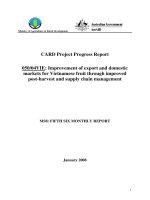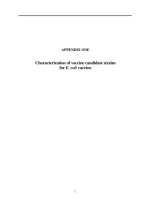Báo cáo nghiên cứu khoa học " Management of Phytophthora diseases in Vietnamese Horticulture - MS3 " pot
Bạn đang xem bản rút gọn của tài liệu. Xem và tải ngay bản đầy đủ của tài liệu tại đây (114.44 KB, 8 trang )
Ministry of Agriculture & Rural Development
CARD Project Progress Report
Management of Phytophthora diseases in
Vietnamese Horticulture
CARD 052/04VIE
MS3: SECOND SIX-MONTHLY REPORT
January 2006
1
1. Institute Information
Project Name
Management of Phytophthora Diseases in
Vietnamese Horticulture
Vietnamese Institution
National Institute of Plant Protection, Hanoi
Vietnamese Project Team Leader
Dr Nguyen Van Tuat
Australian Organisation
The University of Sydney
Australian Personnel
Professor David Guest
Date commenced
April 2005
Completion date (original)
December 2006
Completion date (revised)
April 2007
Reporting period
Second 6-monthly report (12 months)
Contact Officer(s)
In Australia: Team Leader
Name:
Professor David Guest
Telephone:
(02) 9352.3946
Position:
Professor of Horticulture
Fax:
(02) 9351.4172
Organisation
The University of Sydney
Email:
In Australia: Administrative contact
Name:
Ms Luda Kuchieva
Telephone:
(02) 9351 7903
Position:
Research Grants
Administration Officer
Fax:
(02) 9351 3256
Organisation
The University of Sydney
Email:
In Vietnam
Name:
Dr Nguyen Van Tuat
Telephone:
+84 4838 5578
Position:
Director
Fax:
+84 4836 3563
Organisation
National Institute of Plant Protection
Email:
2. Project Abstract
The effective management of Phytophthora diseases in Vietnam is currently limited by
the lack of knowledge and understanding at the scientific, extension and farmer levels.
This project aims to extend sustainable and effective disease control and management
recommendations to a range of horticultural crops throughout Vietnam, thereby
improving farmer outcomes by reducing crop losses due to Phytophthora. The second
milestone of this CARD project has been completed and relevant activities are described.
Extension Training Workshops were held at NIPP-Hanoi, FTRDC-Hue and SOFRI-My
Tho in Vietnam in August (NIPP, FRTDC) and October (SOFRI), 2005. Training
manuals were distributed to all participants. Farmer trials to develop integrated disease
management recommendations, based on the PAR techniques learned during the Training
Workshops, have been established in collaboration with staff from the various scientific
research institutes. Data from these trials are currently being collected and results from
these projects will be discussed at the final workshop in November, 2006. In completing
these activities we have met the targets set in the second milestone.
3. Executive Summary
The objective of this project is to extend sustainable and effective disease control and
management recommendations developed in previous research, to a wide range of
horticultural crops throughout Vietnam, thereby reducing crop losses due to Phytophthora
diseases and improving smallholder productivity.
Following the scientific training workshops held in Vietnam and the subsequent scientific
study tour of Australian horticulture sites by Vietnamese scientists, scientific staff in
Vietnam were well equipped to transfer disease diagnosis skills and knowledge of
management strategies to extension agencies and farmers. This report describes three
two-day extension training courses organised by staff at National Institute for Plant
Protection (NIPP)-Hanoi, Fruit Tree Research and Development Centre (FTRDC)-Hue
and Southern Fruit Research Institute (SOFRI)-My Tho, Vietnam between August and
October, 2005. The workshops were attended by 80 staff from extension agencies in 16
Provinces who were trained in integrated disease management strategies. The gender
balance of participants was tipped towards males with 32% of participants at all three
workshops being female. This pattern was similar to that seen in the first series of
scientific training workshops held in June, 2005.
Training Manuals, both hardcopies and CDs, were distributed at each workshop. The
training manuals were based on the manual developed for the first series of scientific
training workshops held in June 2005 with some corrections to the Vietnamese
translations of the earlier edition. The manual was well received and provides a
comprehensive future reference point for participants.
The Extension Training Workshops provided a hands-on approach to diagnosis and
management of Phytophthora diseases in Vietnam. Extension staff were trained in
pathogen identification, disease diagnosis, disease management and PAR. Lecture
sessions introduced participants to a variety of Phytophthora species and the diseases
they can cause on a range of plants, the impact of Phytophthora diseases on horticultural
crops, the concepts of disease diagnosis, pathogen isolation and identification, disease
epidemiology and disease cycles. This knowledge was implemented during field trips to
identify diseased plants and collect material for laboratory analysis. In the laboratory
participants learnt techniques to isolate Phytophthora from soil and plant material and to
identify Phytophthora as the causal organism of the disease. A selection of disease
management options were developed to present to farmers as part the extension
recommendations and participatory research. On-going support to project staff has been
provided by email.
To promote awareness of improved farming and disease management practices amongst
farmers, Vietnamese scientific and extension staff organised farmer training sessions and
on-farm participatory research trials. Over 220 farmers are involved in the PAR trials
across the three regions. The trials will be monitored and results discussed at the final
project workshop in November 2006. A summary of the extension training workshops
and the farmer trials can be found in Appendix I. The information presented in this report
addresses the targets required to fulfil the second milestone of CARD project number
052/04/VIE.
4. Introduction & Background
The diverse geographic and climatic regions of Vietnam enable the cultivation of a broad
range of plants. Tropical fruit trees are concentrated in the northern and southern parts of
Vietnam and temperate crops in the northern and central highlands. The range of climatic
conditions also provides an ideal climate for Phytophthora species. The genus
Phytophthora is responsible for extensive economic damage in a wide range of
horticultural crops throughout the country, resulting in large reductions in yield and
significant economical losses.
Information on the occurrence and distribution of Phytophthora species present in
Vietnam, disease transmission and progression, and suitable control methods is limited.
Expertise in the diagnosis and management of Phytophthora diseases, including
appropriate quarantine procedures, is also poor. A strategic approach to the future study
and control of Phytophthora diseases is needed. This project aims to improve smallholder
productivity and alleviate poverty, especially in the Mekong and Central Coast regions by
improving the skills of relevant scientific and extension staff and their capacity to
implement disease management recommendations with farmers.
This project focuses on local disease problems identified by informal surveys and
smallholder demand. In the south, the priority crops were identified as pineapple, citrus,
and black pepper, while citrus, black pepper and rubber will be the main focus in the
centre, and litchi, tomato and potato in the north. The Australian and Vietnamese project
team will run a series of workshops and supervise short on-farm research projects. Our
workshops aim to fill the current gaps in knowledge of Phytophthora diseases at all levels
in Vietnamese horticulture. Scientific workshops at each site will involve staff of the
three collaborating institutes as well as relevant staff from universities. These workshops
will focus on the biology of Phytophthora, the diseases it causes, and potential
management practices. Staff will be trained in diagnosis at the field and laboratory levels.
The hands-on training workshops will contribute to capacity building in the research and
extension institutes involved. Scientific staff will then be equipped to transfer diagnostic
skills and Phytophthora disease management strategies to extension agencies and
farmers. The first Scientific Training workshops were held at the National Institute for
Plant Protection (NIPP)-Hanoi, Fruit Tree Research Development Centre (FTRDC)-Hue
and Southern Fruit Research Institute (SOFRI)-My Tho in June 2005 and were discussed
in the first six-monthly project progress report. The final training Scientific Training
Workshop to be organised by the Australian partners is scheduled for November 2006.
The second level of workshop will focus on symptom recognition and the application of
integrated management to smallholder farmers. Between August and October, 2005
Vietnamese scientific staff from each of the three institutes ran workshops for Provincial
Plant Protection Sub-Division (PPSD) staff, who will then supervise participatory
research and other extension activities involving smallholder farmers. The crops
identified above will form the basis of the research extension activities. The Australian
partners will support research and extension staff in the development of integrated
disease management strategies for each crop in each region, the design and
implementation of Phytophthora training workshops for provincial PPSD extension
workers in each region and the design and implementation of PAR and other extension
activities involving PPSD staff and smallholders. Results from the PAR trials will be
presented at the final workshop in November 2006.
The third level of training in Vietnam will disseminate the results to smallholders in 5
provinces in each region through Participatory Action Research (PAR) methodologies
learned during this and previous projects. Farmers will be offered a range of farm
management strategies and will be supported in their implementation of the chosen
strategy. These farm-trials have been established and Australian collaborators will visit a
selection of the farms in February 2006. The farmers involved in the PAR will become a
focus for future extension activities.
Selected scientific staff will also be given an opportunity to undertake a study tour to
Australia where they will learn about nursery best practice and orchard management, as
well as advanced techniques in pathogen identification and research training. Two
scientists (Mrs Nguyen Thi Ly (NIPP) and Dr Nguyen Van Hoa (SOFRI)) visited
Australia in July 2005 to participate in a training and study tour to examine nursery best
practice and horticultural production in southern Queensland, and for further training in
Phytophthora diagnostics. Mr Doan Nhan Ai (FTRDC) will visit Australia in July 2006.
This aims to maximise long-term benefits to each institution by building institutional
capacity by exposing Vietnamese scientists to Australian horticultural practices and build
relations between Australian and Vietnamese scientists.
5. Progress to Date
5.1 Implementation Highlights
A detailed implementation of the project progress to date is provided in the attached
Progress Report Logframe.
The second milestone has been reached with the following targets implemented:
1. Visit by two Vietnamese scientists (Mrs Nguyen Thi Ly from NIPP, Hanoi, and Dr
Nguyen Van Hoa from SOFRI, My Tho) to Australia in July, 2005. Mr Doan Nhan
Ai from FTRDC did not receive his visa in time to travel and will visit Australia in
July 2006.
2. Completion of extension training workshops by Vietnamese institutional staff at
NIPP-Hanoi, FTRDC-Hue and SOFRI-My Tho. A total of 80 extension personnel
participated in the workshops. The actual target 75 participants.
3. Distribution of training manuals to participants of the Extension Training Workshops.
4. Establishment of farmer trials and PAR in each of the three regions (north, central,
south). Over 220 farmers from 16 provinces are involved in the farmer training and
PAR. Details of the participating farmers and research projects from SOFRI were not
received in time to be included in this report.
5. Promotion of awareness of pathogens, disease and disease management strategies
amongst farmers through establishment of PAR trials and extension activities.
5.2 Capacity Building
1. Scientific study tour of Australia
The study tour conducted in July 2005 exposed the Vietnamese scientists to nursery and
horticultural production best practice techniques as well as techniques in pathogen
identification and research training. Scientific staff will then be equipped to transfer
diagnostic skills and Phytophthora disease management strategies to extension agencies
through extension workshops and farmer training programs. Study tour reports from Mrs
Nguyen Thi Ly and Dr Nguyen Van Hoa are attached in Appendix II.
2. Extension Training Workshops
The Extension Training Workshops in this project aim to fill the current gaps in
knowledge of Phytophthora diseases at all levels in Vietnamese horticulture. Hands-on
Extension Training Workshops were held at NIPP, FTRDC and SOFRI between August
and October, 2005 and included a total of 80 staff from Provincial Plant Protection Sub-
Division (PPSD) (Appendix III). The Extension Training Workshops focused on the
recognition of disease symptoms and the application of sustainable and effective
integrated management strategies. A comprehensive training manual based on that
developed for the first Scientific Training Workshop was provided to workshop
participants as both a hard copy and an electronic copy (CD). The development and
distribution of the training manual provide participants with a guide to which they can
refer as the need arises.
Staff who participated in these training workshops will now supervise participatory
research and conduct other extension activities involving smallholder farmers. The crops
identified above will form the basis of the research extension activities. The Australian
partners will visit PAR sites in February 2006 to support research and extension staff in
the design, implementation and monitoring of PAR and other extension activities
involving PPSD staff and smallholders. Workshop participants will present the results of
their participatory research trials at the final workshop in November 2006.
3. Farmer Participatory Action Research Trials
Farmer Participatory Action Research Trials have been established in each of the three
regions (Appendix IV) and involves over 220 farmers from 16 provinces. The target set
during project conception was 375 participating farmers. While farmer training by SOFRI
staff in the south has begun, details of participating farmers and the PAR trials were not
available in time to be included in this report. It is anticipated that the number of farmers
participating in the trials will be closer to the target of 375 when the participating farmers
from the SOFRI trials are included. The trials will be monitored over the final 12 months
of the project. Inclusion of on-farm trials and the expansion of extension activities will
enable dissemination of knowledge acquired during the workshops to promote awareness
of the pathogen, skills in disease diagnosis and improved farm hygiene and disease
management strategies. The farmers involved in the PAR will provide a valuable contact
for future extension activities.
5.3 Publicity
A summary of this CARD project, along with some photos, will shortly be available on
the Faculty of Agriculture, Food and Natural Resources website
().
6. Report on Cross-Cutting Issues
6.1 Gender and Social Issues
A greater proportion of participants at the extension workshops were male (67.5%) than
female (32.5%). This was primarily due to the larger number of males (80% and 73%)
attending the workshops in Hue and My Tho. The balance of males and females was
more evenly distributed at NIPP in Hanoi.
7. Implementation & Sustainability Issues
7.1 Issues and Constraints
Mr Doan Nhan Ai did not receive his visa in time to participate in the scientific tour of
Australian horticulture in July 2005. He will participate in a similar tour in July 2006.
No other issues were encountered.
7.2 Options
The targets of the second milestone have been met. The project is running well and no
changes are required.
8. Next Critical Steps
The activities that will be undertaken in the next six months are:
1. Scientific training tours of Australia for Mr Ai from FTRDC who did not receive his
visa in time to participate in the tour in July 2005.
2. Australian partners to visit Vietnamese farm trial sites in February 2006, meet with
Vietnamese team and discuss progress and activities for 2006.
3. Review farmer training and extension activities.
4. Final workshop in November 2006 to discuss outcomes of PAR and farmer trials.
9. Conclusion
The objective of this CARD project is to reduce crop losses due to Phytophthora diseases
through extension of sustainable and effective disease management recommendations and
thereby improve smallholder farmer productivity. Extension training workshops were
held at NIPP-Hanoi, FTRDC-Hue and SOFRI-My Tho for 80 staff from provincial
extension agencies. The hands-on approach to teaching and learning in the workshops
will contribute to capacity building in the extension institutes involved. Extension staff
are equipped to transfer Phytophthora disease management strategies to farmers.
Knowledge gained from these workshops will also enhance the capacity of extension
workers to address future disease risks. To promote awareness of improved farm and
disease management practices amongst farmers, a selection of disease management
options were developed to present to farmers as part of the extension recommendations.
Farmers have been selected to participate in on-farm trials and PAR to actively
disseminate the extension information. The results of the farmer trials will be discussed in
the final project workshop to be held in November, 2006. In completing these activities
we have successfully addressed the second milestone.
